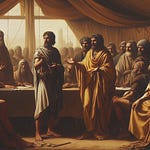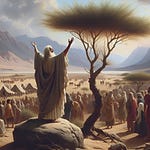Chapter Notes
Have you ever wondered what your last words might be to your loved ones?
In Genesis 49, the Holy Spirit uses Jacob to give us one of fullest accounts of a saint ready to pass into eternity.
Commentary
In a book marked by the record of many deaths, this remarkable scene affords great instruction to Moses and those that left Egypt with him. The early record of this family is littered with sin and its devastating consequences, so much so that we might assume it would splinter a family. Despite this and a life-threatening famine, everyone is in Egypt and gathered around their dying father. Jacob experiences perhaps his most prophetic moment at the close of his life. Jacob’s eyes were dim, but the eye of faith was brighter than ever. I cannot give time to explain how Jacob rightly prophesied over each tribe, but I will reflect on what stands out.
vv. 1–27 - Reuben learns there are consequences for not being a faithful firstborn. He ought to have learned from Cain, Ishmael, and Esau, but he didn’t. Simeon and Levi are viewed as men of cruelty because of their act on Shechem. However, God would turn Levi’s scattering for good, appointing him to function in ministry to Israel. With such a beginning, we might well wonder, if the hope of God’s covenant promises depends on these sons, the future is bleak. But grace intervened in Judah. Even though he had children to a Canaanite, wronged Tamar and advocated for the sale of Joseph—which was a capital crime in Israel—yet, God has an immutable purpose. Judah is marked with multiple blessings, such as praise, power, preeminence, and prosperity. Jacob then moves on to Zebulun, who would settle with its eastern border being the Sea of Galilee and the western border being the Mediterranean Sea. Issachar shows strength, but also the complacency which leads to servitude. Dan is described as a serpent, which makes us think of Satan. The record of Dan is not encouraging. In Judges 18, Dan establishes a center of false religion and idolatry. When the nation is divided and Jeroboam comes to the throne—to supplant Jerusalem as the place of worship—he constructs two centers with the worship of golden calves, one of which was in Dan. When the tribes are listed in Revelation 7, Dan is not mentioned. Dan’s future is bleak, and it causes Jacob to cry out in v. 18, “I have waited for thy salvation, O LORD.” From there, Jacob makes brief statements concerning Gad, Asher, and Naphtali. Then comes Joseph. If Judah is largely pointing to the future, Joseph largely reveals what God has fulfilled. What marks Joseph is that even though he suffered, he was fruitful. Even though men tried to destroy him, God upheld him. Finally, there’s a word to Benjamin, who will ravin as a wolf, i.e. tear to pieces, and is depicted as a successful warrior.
vv. 28–33 - The chapter closes with Jacob doing two things before his passing; blessing his sons and commanding his sons. However negative the prophecies, they are all blessed because none of them were rejected as Esau was. He requires of them that they bury him with Abraham, Sarah, Isaac, Rebekah, and Leah. Jacob then lifts his feet into his bed and passes away.
Application
Warnings from God are designed to provoke an obedient response. Much that Jacob declares is negative. But negative truth is better than positive lies. Rather than responding in a fatalistic way, each of the children needed to respond in repentance and seek by God’s grace to be recovered. They needed to be like the Ninevites, who did not simply accept Jonah’s message of coming judgment, but turned from their sins to God and found mercy. You may feel like your past and your character has charted for you an unchangeable course, but that is not so. Nothing is impossible with God. He loves to write unpredictable endings to unhappy beginnings. But while God will withhold the worst of judgments from His people, He does not always withhold consequences. Read 2 Samuel 12 and see that although David may be spared death for his sin, his child will not. These truths are to sober the people of God so that an unbelieving world learns that God is not to be trifled with. His judgments are real and His mercy must be sought.
Children may differ greatly from their parents. The variety of characteristics on display in this chapter ought to be instructive. It is not uncommon for us to ask where certain traits in our children come from. While we have a responsibility to put a good example before them, there is no promise they will be like us, either in our graces or in our sins. While pride might wrongfully run to our personal defense, Satan may also wrongfully charge us with guilt where there is little or no warrant. If your children are wayward, be careful that you do not contribute more blame to yourself than is fitting. We have enough guilt due to legitimate sins without multiplying it.
Instability is the destroyer of potential. The description of Reuben stands as one of the strongest warnings of this chapter. We’ve seen glimpses of his attempt to be honorable, such as hindering his brothers in their desire to kill Joseph, and his willingness to give his two sons for Benjamin, but he sacrificed his privileges for a moment of pleasure (Gen. 35:22; 1 Chron. 5:1). The words “unstable as water, thou shalt not excel” could be written over many a man who has failed to finish college degrees, hold down a job, or see a marriage through to death. We must ask God for grace to suppress our wicked impulses. For Reuben it was lust, for Simeon and Levi it was anger. Instability in one area can destroy warriors. If you know your weakness, do not let sleeping dogs lie. By God’s grace, kill it.
Parents must love God more than their children. Jacob’s language in v. 6 is one that parents must take to heart. Jacob’s love for God meant he feared any association with the wickedness of his sons and strongly detests what they did because it did not reflect the character of God’s people. It is not a matter of if, but when, your children will be used to test your love for God. At such points, you might believe you are helping them through repeated concessions and lack of pushback. You are not. Like Jacob in v. 18, you may have to turn from the disappointment of a child and rest in the One who never disappoints His people.
Believers are marked by blessing and obedience. As we noted, Jacob’s closing responsibility is to bless and command his sons. Is this not a picture of how our heavenly Father deals with us? Does He not bless us with the gospel and command us to respond appropriately? Dear Christian, though you stand complete in Christ, fully justified through our Savior’s merits, do not live without a sense of indebtedness to God. There ought to be an awareness of the privilege of obeying our Father in heaven and seeking to exhibit His goodness, love, and mercy to a perishing world.
Christ will gather the nations to Himself. There are some challenges to interpreting parts of this poetic prophecy, but let us not miss the hope of v. 10, that in Jesus, who came from the tribe of Judah, we find the central figure of the world. Having learned of Him in Genesis 3:15, we now see that the fallen sons of Adam from every nation must make their way to the offspring of Judah. Now that the lion of the tribe of Judah has been victorious over death and hell, have you fallen before His feet? Don’t delay, do so today.
“Jacob did not yield up the ghost until he had delivered the last sentence of admonition and benediction to his twelve sons. He was immortal till his work was done. So long as God had another sentence to speak by him, death could not paralyze his tongue.” — Charles Spurgeon











